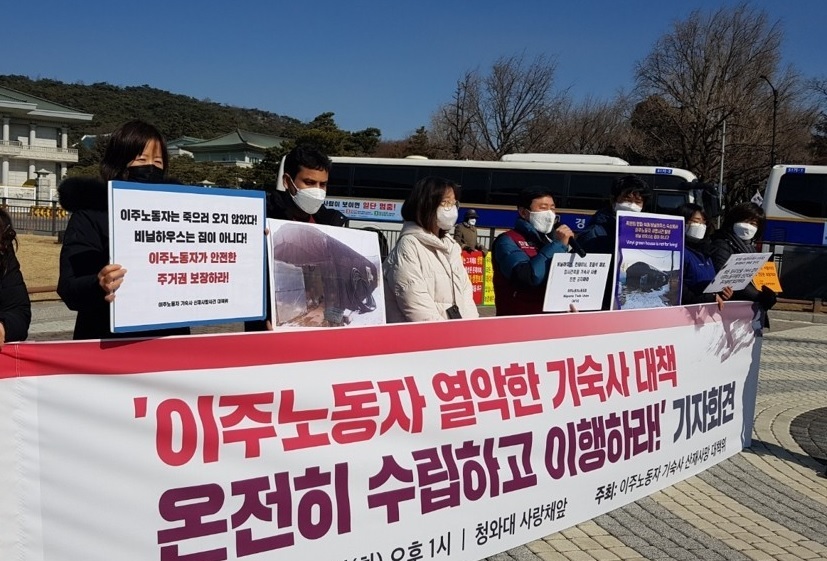Migrant workers report more claims of sexual assault on farms
Lawmakers propose bills to improve protection, working conditions
By Shin Ji-hyePublished : March 30, 2021 - 15:09

Amid a growing shortage of migrant workers in South Korea, reported cases of sexual violence, assault and overdue wages among foreign workers have continued to emerge as they accuse their employers for exploiting their vulnerable status.
Police said on Monday it is investigating a case of sexual assault after receiving a complaint that a Cambodian worker was sexually assaulted by a farm owner.
The complaint, filed by a migrant worker rights protection civic group, alleges that the farm owner in South Chungcheong Province forcibly entered a female worker’s accommodation and sexually assaulted her several times last year.
They also claimed in the complaint, “The owner of the farm forced her to undergo an abortion when she got pregnant, and threatened to ‘make her an illegal immigrant’ if she ran away.”
The case is among a series of reported sexual assaults and violence among foreigners who have accused their employers for taking advantage of their vulnerable status in recent years.
A farm owner in his 50s was sentenced to prison in November 2019 for trying to sexually assault a foreign worker on his farm.
The man, who ran a farm in Hongcheon, Gangwon Province, took the female worker to a cabin and had attempted to sexually assault her before he was stopped by a fellow worker.
The same year, another owner of a farm in Gangwon, was also sentenced to probation after sexually harassing female employees on his farm. The foreign workers were deployed to the farm under the government’s employment program.
Both male and female workers have suffered abuse by their employers.
In December last year, a man in his 60s in Seogwipo on Jeju Island was accused of hiring illegal immigrants and threatening to withhold wages from them.
He assaulted a group of foreign workers who had demanded payment for their unpaid wages -- about a total of 86 million won (about $75,817) -- and threatened to report and deport them.
The court sentenced the man, who was handed over to trial on charges of violating the Immigration Control Act, to 10 months in prison and two years of probation.
As more cases have come to light, there have been growing calls to improve working conditions and protection for migrant workers in blind spots.
About 840,000 foreign workers were employed as of 2020, according to Statistics Korea. Many of them are known to be engaged in manufacturing, construction and farming industries with poor working conditions.
The Ministry of Labor said more than 70 percent of foreign workers in farming and fishing villages live in temporary facilities within greenhouses. Overdue wages for foreign workers surpassed 100 billion won in total last year.
In January, Rep. Ahn Ho-young of the ruling Democratic Party of Korea proposed a partial revision to the Act on the Employment of Foreign Workers, which mandates employers undergo labor and human rights education before they are allowed to hire foreign workers.
“Although the number of foreigners engaged in economic activities in Korea is increasing, there is no institutional education to improve their human rights and working environment,” Ahn said.
The revised bill would also provide legal grounds to impose fines of up to 5 million won if violated.
The same month, Rep. Park Dae-soo of the main opposition People Power Party also proposed a partial revision of the act to make the anti-discrimination clause for foreign workers more specific.
“Although unfair treatment of foreign workers is prohibited under the current law, it is ineffective because it does not specify any specific provisions,” he said, adding it should make clear working conditions such as wages, working hours and benefits.
“As foreign workers are an axis of the domestic labor market, there is a need to share the perception that they are part of our society,” Park said. “It is time to prepare various legal and institutional devices to improve the poor working environment and ban discriminatory treatment.”
By Shin Ji-hye (shinjh@heraldcorp.com)



![[Exclusive] Korean military set to ban iPhones over 'security' concerns](http://res.heraldm.com/phpwas/restmb_idxmake.php?idx=644&simg=/content/image/2024/04/23/20240423050599_0.jpg&u=20240423183955)

![[Graphic News] 77% of young Koreans still financially dependent](http://res.heraldm.com/phpwas/restmb_idxmake.php?idx=644&simg=/content/image/2024/04/22/20240422050762_0.gif&u=)



![[Pressure points] Leggings in public: Fashion statement or social faux pas?](http://res.heraldm.com/phpwas/restmb_idxmake.php?idx=644&simg=/content/image/2024/04/23/20240423050669_0.jpg&u=)










